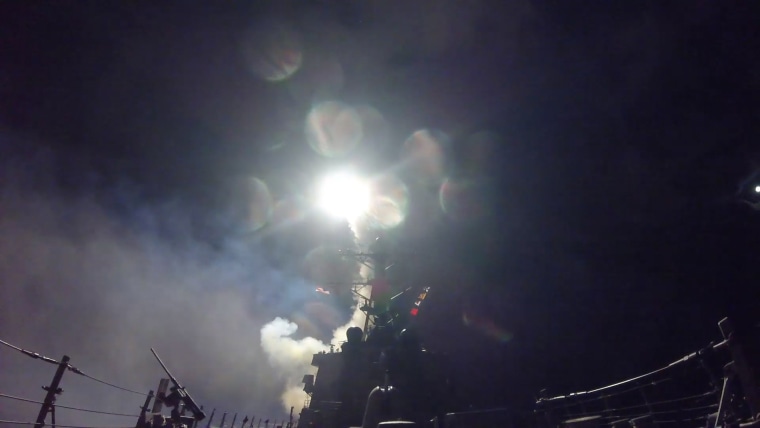A U.S. missile strike against a Syrian government airfield in response to an apparent chemical weapons attack drew support from some members of Congress, but also concerns about lawmakers' role in authorizing further action.
The strikes involving 59 Tomahawk cruise missiles fired from U.S. Navy warships in the Mediterranean marks the first time that the United States has launched strikes against forces of the government of Syrian president Bashar al-Assad in the six-year conflict that a research group says has killed at least 400,000 people.
One of the largest rebel opposition forces in Syria praised the missile strike, while Syrian television called the strikes "American aggression."
"The armed opposition welcomes any U.S. intervention through surgical strikes that would deter the Assad regime capabilities to kill civilians and shorten the suffering of our people," the opposition group Ahrar Al Sham, which is backed by Gulf states, said in a statement.
On Capitol Hill, some Republicans praised the strikes as delivering a message to Assad that the United States would not turn a blind eye to atrocities in the civil war.
"Unlike the previous administration, President Trump confronted a pivotal moment in Syria and took action," Republican Sens. John McCain, R-Arizona, and Lindsey Graham, R-South Carolina, said in a statement. They called it a “credible first step” but said Assad’s air force must be taken "completely out of the fight."
Related Trump: Why I Launched a Missile Strike on Syria
U.S. officials told NBC News that aircraft and infrastructure at Shayrat Airfield in Homs province were targeted. The strike comes after an alleged use of chemical weapons, suspected to be a nerve agent, by the Syrian government this week that killed at least 100 people.
Russian forces were notified ahead of the U.S. strikes using an established deconfliction line, the Pentagon said. Russia backs the Assad regime and has conducted air strikes in the conflict. A spokesman for Russian President Vladimir Putin said the strike was an act of "aggression against a sovereign country violating the norms of international law, and under a trumped-up pretext at that."
Retired U.S. Army Gen. Barry McCaffrey, an NBC News analyst, said the military impact of the strikes was likely nominal.
"I think the best thing that could come out of it is the Russians say, 'Oh my gosh, we’ve gone too far,'" McCaffrey said on MSNBC. "The U.S. Air Force and U.S. naval air power is so significant and capable compared to the Russian presence in general — never mind their deployed strength in Syria — they are very unlikely to want to take us on in direct combat."
And Sen. Rand Paul, R-Kentucky, rejected the missile strikes as unnecessary and unauthorized.
"While we all condemn the atrocities in Syria, the United States was not attacked," he said in a statement. He said that Trump needs Congressional authorization for military action.
House Speaker Paul Ryan, R-Wisconsin, called the missile strike "appropriate and just."
"These tactical strikes make clear that the Assad regime can no longer count on American inaction as it carries out atrocities against the Syrian people," Ryan said.
Democratic Senate Minority Leader Chuck Schumer, D-New York, had praise for the strike, saying "making sure Assad knows that when he commits such despicable atrocities he will pay a price is the right thing to do" — but he called on Trump to come up with a strategy on Syria and consult Congress.
Democratic Sen. Chris Coons, a member of the Foreign Relations Committee, said Trump must seek authorization for use of military force. Sen. Mike Lee, a Republican who represents Utah, also called on Trump to make the case for any increased military action in Syria to the American people and Congress.
House Minority Leader Rep. Nancy Pelosi, D-California, called the military strikes a “proportional response.”
Senator and former vice presidential candidate Tim Kaine, who is a member of the Armed Services Committee, called Assad "a brutal dictator who must be held accountable for his actions" but he said Congress needs to approve military action.
"Congress will work with the president, but his failure to seek Congressional approval is unlawful,” Kaine said.
President Barack Obama in 2013 contemplated conducting air strikes and lobbied members of Congress for approval, but no vote was ever called. At the time, Trump on Twitter said "the President must get Congressional approval before attacking Syria-big mistake if he does not!"
Trump on Wednesday condemned the chemical weapon attack and said "My attitude toward Syria and Assad has changed very much."
The missile strikes will likely send a message to Assad about the use of chemical weapons, said Linda Robinson, a senior international policy analyst at the RAND Corporation.
"I think 59 TLAMs [Tomahawk Land Attack Missiles] is going to produce a significant effect — if you’re talking the language of military diplomacy this was more than a pinprick," Robinson said in a phone interview. "This was a clear message that more at least chemical weapons will probably evoke a further response."
The rapid response was likely due not only to the graphic images of children and others dying in the chemical weapon attack, but also an attempt to correct what Robinson called a mistake in diplomatic messaging from the administration.
"I think there's no question the administration was also prompted to act, not just by the footage and seeing the civilian casualties, but they had made several statements, including the ambassador to the U.N., suggesting there was not going to be really an anti-Assad component to the U.S. policy," Robinson said. "Which clearly Assad read — whether it was intended or not — as frankly a blank check to proceed."

